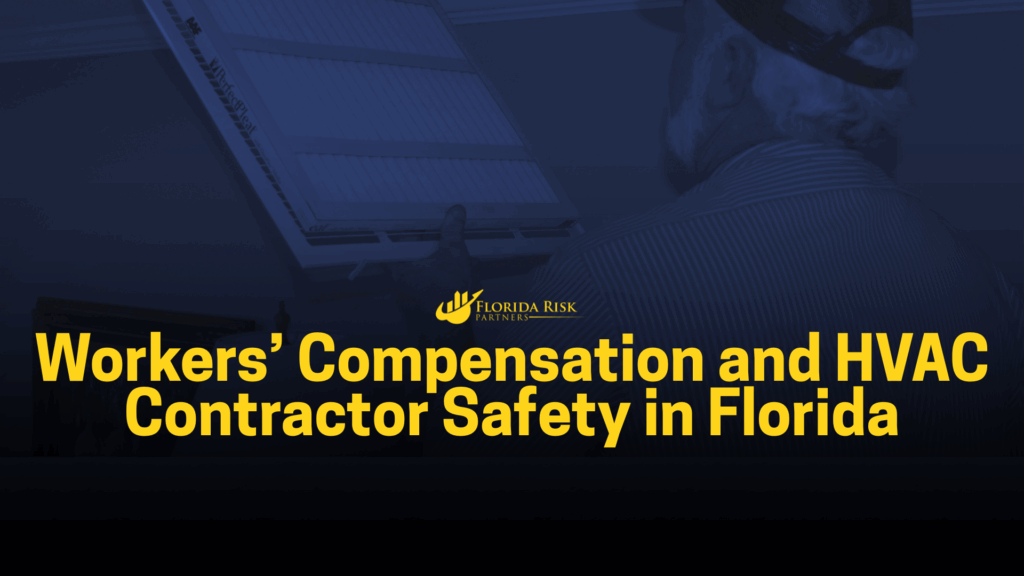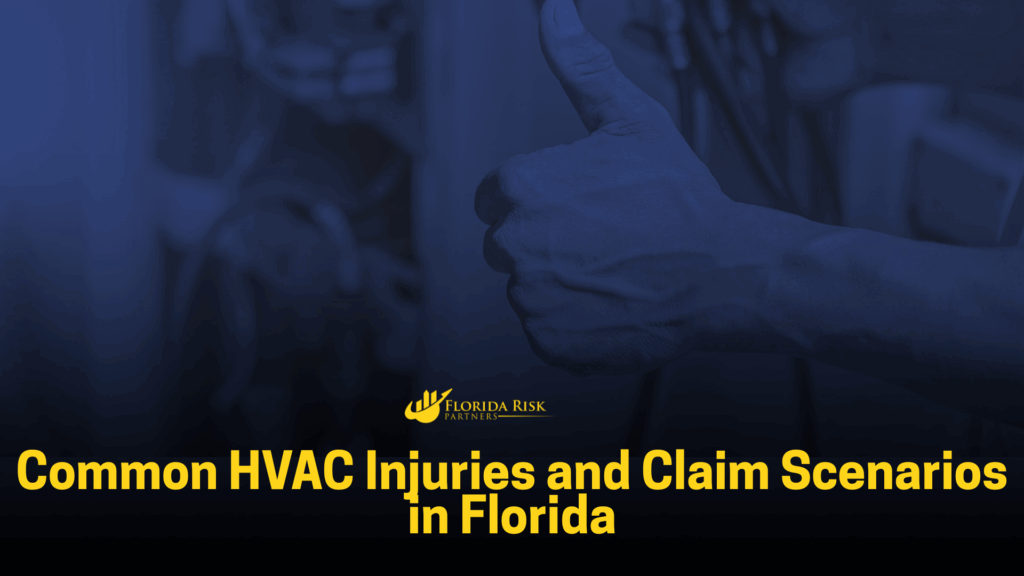-
Main Office: 1434 E. Bloomingdale Ave Valrico, FL 33596-6110
-
Phone: (888) 601-6660
-
Email: info@floridariskpartners.com

In the HVAC industry, your technicians are your greatest asset—and your biggest liability. Every day, they’re exposed to ladders, hot rooftops, tight crawlspaces, electrical systems, power tools, and Florida’s intense heat and humidity. One misstep, one fainting spell in an attic, or one fall from a ladder, and your business could be looking at a serious injury, a costly workers’ comp claim, and potential lawsuits.
That’s why workers’ compensation insurance and a strong safety culture go hand-in-hand in protecting both your team and your HVAC business in Florida. This week, we’re diving deep into what HVAC employers need to know about workers’ compensation laws, injury trends, and actionable safety strategies that keep claims low and your team protected.
What Is Workers’ Compensation Insurance?
Workers’ compensation insurance provides medical benefits, lost wage replacement, and rehabilitation costs to employees who are injured or become ill on the job. In return, it typically protects your business from being sued by injured employees for those incidents.
In Florida, workers’ compensation is required by law for most businesses in the construction trades—including HVAC contractors.
Florida Workers’ Comp Requirements for HVAC Contractors
Florida classifies HVAC contractors under the construction industry category. Here’s what that means for you:
- If you have one or more employees, you are required to carry workers’ compensation insurance.
- This includes part-time, seasonal, and temporary workers.
- Even owners/operators who are active in the field must be covered—unless they file an exemption.
- Subcontractors without workers’ comp are a liability to your business. If they’re hurt and uninsured, you could be held responsible.
Failing to carry valid workers’ comp coverage can result in:
- Cease-and-desist orders
- Civil penalties equal to twice the amount of the premium you should’ve paid (over 2 years)
- Stop-work orders that halt your entire operation
Don’t gamble with compliance. It’s not just about avoiding fines—it’s about protecting your people and your business.
Common HVAC Injuries and Claim Scenarios in Florida

HVAC technicians are exposed to more hazards than most other trades. From extreme heat to electrical exposure, their working conditions are demanding and dangerous.
1. Falls from Heights
Whether on ladders, scaffolding, or rooftops, falls are among the most common—and, consequently, the most serious—HVAC injuries. For instance, a technician falling off a roof while repairing a rooftop unit could result in months of missed work and, in turn, tens of thousands in claims.
2. Heat Stress and Dehydration
Florida’s heat and humidity are no joke. Working in attics or crawlspaces can quickly lead to heat exhaustion, dehydration, or even heat stroke—especially during summer months when demand is highest.
3. Electrical Burns and Shock
Improper grounding or contact with live wires during installations or repairs can cause burns, shocks, or even cardiac arrest. Even experienced techs can make mistakes when rushing.
4. Lifting and Musculoskeletal Injuries
Hauling HVAC units, ductwork, and tools can cause chronic injuries—such as back strains, herniated discs, and joint damage. As a result, these repetitive strain injuries may take weeks or even months to recover from.
5. Respiratory Hazards
Poorly ventilated job sites can expose techs to mold, refrigerant fumes, fiberglass particles, or asbestos. Consequently, long-term exposure can lead to respiratory illness or, in some cases, occupational disease claims.
Real-Life Florida HVAC Workers’ Comp Claim Examples
Let’s look at a few real scenarios where workers’ comp coverage saved HVAC businesses from major losses:
Claim Example 1: Attic Heat Stroke in Fort Myers
A technician collapsed from heat stroke while installing ductwork in a poorly ventilated attic. He was hospitalized and out of work for 3 weeks. Workers’ compensation paid for the medical expenses and lost wages, preventing the company from being sued directly.
Claim Example 2: Ladder Fall in Jacksonville
A tech fell off a ladder while inspecting a rooftop system. He broke his leg and required surgery and physical therapy. Total cost: $58,000. The claim was fully covered under workers’ comp, and the technician returned to work after 4 months.
Claim Example 3: Back Injury in Miami
A technician lifted a 120-pound air handler without assistance and suffered a herniated disc. He needed physical therapy and modified duties for 6 weeks. Workers’ comp helped pay for treatment and wage replacement while he recovered.
How Workers’ Comp Helps You AND Your Employees
When claims happen, workers’ compensation helps both parties:
For the Employee:
- Covers emergency and ongoing medical treatment
- Replaces lost wages
- Provides rehabilitation services and job retraining if needed
- Offers peace of mind that their health and income are protected
For the Employer:
- Shields you from being sued for work-related injuries
- Ensures compliance with Florida labor laws
- Helps you maintain productivity by supporting injured workers’ return-to-work process
- May reduce turnover by demonstrating care for your employees’ well-being
Best Practices for Reducing Workers’ Comp Claims

Having insurance is one thing—avoiding claims is another. Here’s how HVAC businesses in Florida can lower their risk and keep premiums in check:
1. Implement a Job-Specific Safety Program
Train employees on:
- Ladder safety
- Electrical hazard awareness
- Heat exhaustion prevention
- Safe lifting techniques
- Personal protective equipment (PPE)
Hold weekly toolbox talks and make safety part of your daily routine.
2. Enforce a “Two-Person Rule” for Heavy Lifting
Don’t let techs move HVAC units or large compressors alone. Make team lifting mandatory, and consider using dollies or mechanical lifts whenever possible.
3. Provide Heat Safety Equipment
Especially in Florida, hydration and heat safety need to be a priority. Equip vans with:
- Water coolers and electrolyte packs
- Cooling towels
- Lightweight, breathable uniforms
- Rest schedules on extreme heat days
4. Pre-Employment Screening
Make sure new hires can safely perform physical tasks. Consider a pre-employment physical or strength assessment for field techs.
5. Light-Duty and Return-to-Work Programs
When an injury does happen, having modified-duty roles available can:
- Help employees recover while staying engaged
- Reduce the cost of lost-time claims
- Improve morale and prevent long-term disability claims
How Workers’ Comp Premiums Are Calculated in Florida
Your premiums are based on:
- Your payroll
- Your classification code (HVAC typically falls under NCCI Code 5537)
- Your experience modification rate (or MOD)
If you have frequent or expensive claims, your MOD increases, and so do your premiums. That’s why proactive safety measures aren’t just about compliance—they’re about cost control.
An effective safety culture helps you keep your MOD low and premiums competitive.
Final Thoughts: A Safer Team = A Stronger Business
You can’t eliminate risk in the HVAC trade—but you can manage it. Workers’ compensation insurance is more than a regulatory box to check—it’s a vital tool for protecting the people who keep your business running.
In Florida, where conditions can be harsh and claims can be costly, the best HVAC companies don’t simply buy workers’ comp; instead, they actively prevent injuries through strong safety practices and comprehensive training.
Is Your Workers’ Comp Program Up to the Task?
We specialize in helping HVAC contractors across Florida reduce claims, lower premiums, and stay compliant with state regulations. Whether you’re due for renewal or just want a second opinion, we can help you build a smarter workers’ comp and safety strategy.
Call Us Or
Schedule an Appointment
Select an agent below to view our online calendars and select a day and time that works best for you or call us directly at 888-601-6660. When you use our online calendars, you will receive an email with more information.



